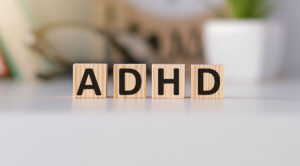Many of the children you are raising have experienced painful losses or abuse. Others were exposed during pregnancy to alcohol or drugs. Still, others have both of those challenges in their history and are living with the impacts today. Those impacts may show up in troubling behavior or learning challenges like ADHD (attention deficit hyperactivity disorder). These kids are at risk for poor mental health and need extra support to learn how to care for their mental health.
The Connections Between ADHD and Mental Health Challenges
 It’s common for kids with ADHD to also struggle with mental health disorders like anxiety or depression. The pressures they encounter daily to keep up at school, stay focused on the task in front of them, and meet the demands of their part-time jobs, family life, and extra-curricular activities are enormous. A brain impacted by prenatal substance exposure, trauma, or grappling with loss is a brain that feels chaotic to manage. The extra work their brains must perform to stay on track daily can be overwhelming and overstimulating.
It’s common for kids with ADHD to also struggle with mental health disorders like anxiety or depression. The pressures they encounter daily to keep up at school, stay focused on the task in front of them, and meet the demands of their part-time jobs, family life, and extra-curricular activities are enormous. A brain impacted by prenatal substance exposure, trauma, or grappling with loss is a brain that feels chaotic to manage. The extra work their brains must perform to stay on track daily can be overwhelming and overstimulating.
When these kids cannot handle everything inside them, they may act out in challenging ways. But they may also shut down or pull away from those around them and isolate themselves from those who could offer the support they need.
These are some common symptoms to consider if you think your grandchild is struggling with their mental health.
- Emotional distance, isolation, or shutting down
- Brain fog – forgetfulness, lack of clarity, etc.
- Decreased motivation or initiative
- Decreased interest or pleasure in things they typically enjoy
- Reduced energy, increased sleep
- Reduced appetite or skipping meals
- Poor quality of sleep or erratic sleep habits
- Increased sadness or anger
How to Help Your Grandchild Manage Mental Health
1. Prioritize physical activity.
Many kids naturally keep their bodies moving. However, when a child (or tween or teen) is overwhelmed or overstimulated, shutting down can be the opposite of what they need. Whether you start by inviting them for an after-dinner walk with you or join a yoga class together, model healthy physical activity and encourage them to join. When their bodies move, healthy brain chemicals called endorphins are released. Those surges can improve moods and sharpen their focus. Even simple activities like stretching can re-wire your grandchild’s brain to lift the fog of anxiety or depression.
2. Start small.
You can help your grandchild (or nephew or cousin) create small, healthy habits that can build upon each other. Start with something simple and small, whether it’s physical activity, meal planning, homework time, or a bedtime routine that sets them up for higher-quality sleep. When a child struggles with chaotic thoughts common to ADHD, it’s tempting for them to try and change everything at once – which leads to being overwhelmed and stressed. Find ways to help your grandchild find one small starting point and feel successful with that before adding more.
Many families of kids with ADHD find checklists helpful. Put even the smallest new habit on the checklist – accomplishing a task and checking it off can be an endorphin rush too! Most of the time, it will be beneficial to pick just one habit at a time to improve or change. For example, changing into pajamas every night before bed is a small habit that can improve the bedtime routine and sleep quality. It messages the brain that now it is time to sleep. Practice this habit every day for a month and then consider what else to layer into the bedtime routine.
3. Be gentle with each other.
Depression, anxiety, ADHD, and other learning challenges are big obstacles to navigate – for you and for your grandchild. Practice compassion for yourself and try narrating it throughout the day when your grandchild can hear you. Be kind and gentle with your grandchild’s mental or emotional state whenever you have the opportunity. Here are a few ways to practice self-compassion that will be easy to practice with your grandchild.
- Gentle self-talk – speak to yourself and about yourself kindly.
- Prioritize healthy sleep habits
- Find nourishing self-care and do it regularly
- Encourage healthy hygiene habits for everyone
- Celebrate small wins – yours and theirs!
- Model healthy balances of rest and work
4. Educate yourself.
The fact that you are reading here on this site says a lot about how much you care for yourself and your grandchild, so kudos to you! Keep learning about managing mental health, ADHD, and the impacts of things like trauma and prenatal substance exposure. Whether you prefer podcasts, audiobooks, reading, or attending seminars or webinars, find a way to keep learning. As you grow in your understanding of your grandchild’s challenges, you are buffering your own mental health, too!
Here are a few reliable places to learn more about mental health issues in children and teens.
- Kinship Care Resource Guide from CreatingaFamily.org
- Topic Library from Grandfamilies.org
- Resource Library from Grandfamilies & Kinship Support Network
- Center for Parent and Teen Communication
